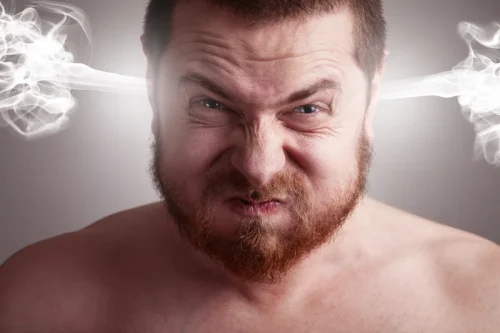
Because he is a member of a support group that stresses the importance of anonymity at the public level, he does not use his photograph or his real name on this website. A lack of impulse control can make a person unable to resist the sudden, forceful urge to fly into a rage or act aggressively. When alcohol suppresses these regulatory functions, it can affect how you express your thoughts and emotions, including anger. Alcoholics anonymous (AA) and alcohol treatment centers offer classes and support group meetings. In these, you can also find support from others in the same situation. Alcohol may be a form of self-medication for people with depression.

Relationship between Alcohol and Anger
Those close to him would talk about his personality under the influence — a character prominent enough to be seen as his alter-ego, “Timmy.” What was Timmy like? Ultimately, Timmy would lead to the death of Paul’s girlfriend who drowned in a boating accident that Paul (in drunken Timmy mode) was responsible for. The good news is that there are newer, easier ways to access support for problem drinking. Online programs like Ria Health can give you access to coaching support, medication to reduce cravings, and handy digital tools. You don’t need to identify as an alcoholic to join either—whatever your goals, we’ll meet you where you’re at. If you often drink to excess—especially if you often black out or fail to remember what you did while drunk—changing your behavior can be difficult.
The Eye-Opening Science Behind Alcoholic Rage
- If you or someone you know are having suicidal thoughts, contact the 988 Suicide & Crisis Lifeline (formerly the National Suicide Prevention Lifeline) at 988 for support and assistance from a trained counselor.
- When we communicate it clearly, and let its motivating force fan our passion and guide our conscience, we can use anger to incite positive change.
- Aggressive men recorded higher activation of the left amygdala than aggressive women and a positive correlation with orbitofrontal cortex (OFC), rectal gyrus, and ACC activity, which was negatively correlated in women.
- While anger is a normal emotion to feel from time to time, intense anger can lead to aggressive behaviors and physical or emotional harm to yourself or others.
- I’ve observed this pattern over several decades in helping clients deal with anger.
- Drinking can affect your emotional experience as it can limit your inhibitory emotions.
- Another study explored the relationship between Posttraumatic Stress Disorder (PTSD), alcohol use, and violence (Blakey et al., 2018).
There is also a theory that the disinhibition that alcohol creates raises the risk of violent behavior. Heavy drinkers are more likely to engage in risky behavior, which alcoholic rage syndrome includes being violent and acting out hostile emotions, often against a loved one. Ultimately, nobody knows what comes first—anger or alcohol use disorder (AUD).
Deconstructing Anger and Alcohol Perception

Drinking alcohol can make us act in ways we wouldn’t normally, including being angry or aggressive. So next time you observe someone drinking heavily at a gathering or bar scene try applying this guide. Remember though that everyone reacts differently to alcohol so these should serve only as general pointers rather than definitive conclusions.
Links between Anger, Aggression, and Alcohol Addiction
- During therapy, you can learn coping mechanisms that can help you return to life without drinking.
- There’s no better way to put it — properly addressing alcohol-fueled aggression is crucial for your well-being and relationships.
- One study published in a journal called Cognitive, Affective, & Behavioral Neuroscience sought to explore factors that make some people more aggressive when they drink.
According to the Substance Abuse and Mental Health Services Administration (SAMHSA), nearly 8 million adults in the United States struggled with both a mental health disorder and addiction in 2014. When a person struggles with both alcohol addiction and anger management problems, the issues exacerbate each other. People can be more prone to alcoholic rage based on genetics, life stressors, antisocial personality disorder, or personality traits such as underlying irritability. In other words, for some anger that they would normally control when sober manifests itself once alcohol disrupts the brain chemistry.
It is important to seek help from a healthcare professional if depression is suspected or if there are frequent feelings of sadness, hopelessness, loss of interest in daily activities, or thoughts of harm to self or others. Like the relationship between stress and anger, depression and anger are connected. Excessive, uncontrolled anger can be a symptom of depression and can lead to or make depression worse. More specifically, holding anger in without expressing it can lead to self-directed anger, which may lead to depression. Intense anger can become a problem when it leads to aggression toward others or is suppressed and has adverse physical and psychological effects. You may be wondering what you can do when someone shows signs of rage after consuming too much alcohol.
- They also noted that men were highly aggressive toward the same gender, while women were aggressive regardless of gender.
- They feel anger to avoid other more challenging emotions and behaviors.
- Intoxicated people may feel more outgoing, lonely, joyful — or angry.
- On the contrary, the reason for the convergence of frequency in the male and female binge drinking habits is estimated to occur due to the large decline in the binge drinking frequency within men than the women.
- When it comes to understanding anger and alcohol, there’s a fascinating psychological interplay at work.
- Similarly, mixed findings were also reported for 5-HT1A and 5-HT2A receptor bindings (Underwood et al., 2008, 2018; Storvik et al., 2009).
- People spend years in therapy and in treatment for issues of their own that are caused by the consequences of this behavior.
- In the Brazilian city of Diadem, limiting the hours of alcoholic sales in bars to 11 p.m.
- One such study included 136 men with a history of intimate partner violence (IPV) (Estruch, 2017).
- At the same time, people with depression may attempt to self-medicate with alcohol.
According to research, many people who become aggressive when drunk score high on the anger-suppression scale. They may be great at masking their feelings under normal circumstances. But since alcohol lowers inhibitions, it may all come spilling out when they drink.

Gender Differences in Binge Drinking, Alcohol-Induced Aggression, and Violence
For example, people who commit terrible sex crimes can be perfectly cool and calculated in the way they stalk and harass their victims. On the flip side, we praise those who don’t show their anger as “well-bred,” “intelligent,” and “sophisticated.” We’ve upheld whole groups of people who tend not to show anger as model citizens. I myself have been one of these Model Minorities—a soft-spoken, frequently-apologizing, high-achieving Asian-American woman. Recognizing that each individual’s journey toward recovery is unique, individualized treatment plans are essential. As alcohol enters the bloodstream, it begins to affect the neurotransmitters in the brain, leading to disruptions in these critical functions.
It’s crucial to recognize that the emotional impact of alcohol varies significantly from person to person and can be influenced by various factors such as individual predispositions, external stressors, and social contexts. Before exploring the common emotional experiences while drinking, it’s essential to understand how anger and alcohol perception are intertwined. For individuals already dealing with anger issues, alcohol can intensify and magnify these underlying challenges. This amplification occurs due to alcohol’s impact on the brain’s neural pathways, particularly those involved in emotional regulation.
